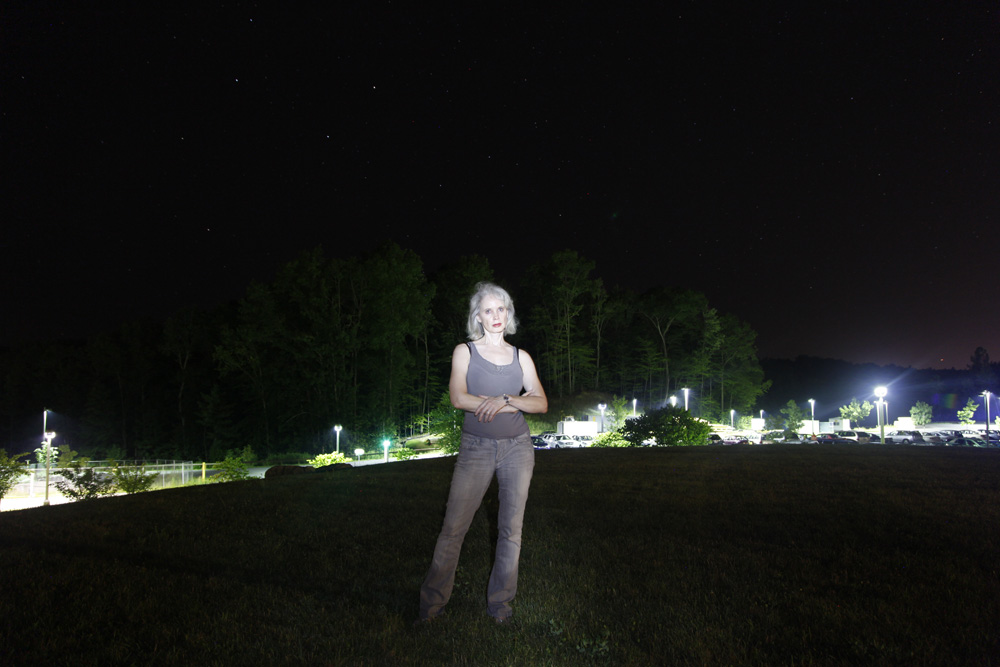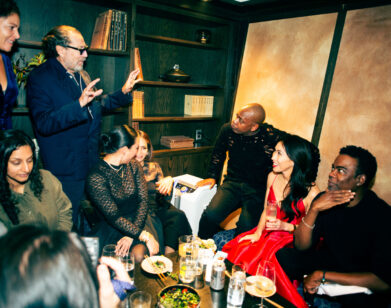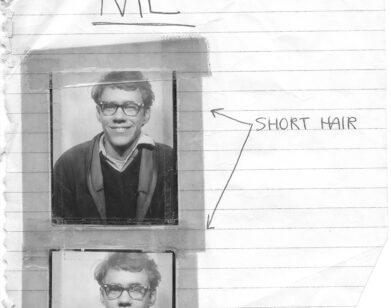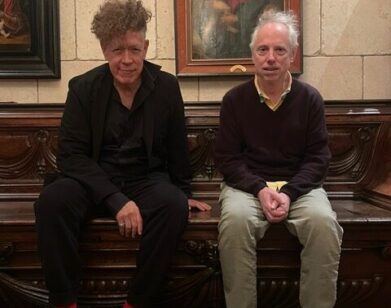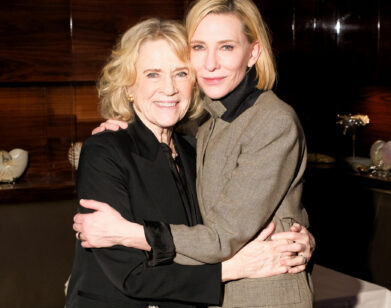Mary Gaitskill
In a way, I first got to know Mary Gaitskill in the dark. In 2011, I began a project in which I made portraits of acquaintances at night, with available light and a single flashlight, as preparation for a larger collection of portraits of strangers and distant relatives, Strangers and Relations. I was on the campus of Skidmore College that summer, where Mary was teaching a writing workshop, and I asked her if she’d be willing to be photographed. I’d met Mary the prior summer as well, but now we were becoming friendly; it was exciting to get to know a writer I’d read with so much enthusiasm beginning in the early ’90s, when I read Bad Behavior, her first collection of stories.
The photo I took tells a lot about the Mary I got to know in those days, haunting, serious, against a backdrop of the unearthly night glow of Skidmore’s campus. Mary was, and is, an unpredictable and thrilling person to have as a friend. She’s honest, generous, funny, and unflinching—one night at dinner at Skidmore, she got into a passionate debate with another writer about the overuse of the word humiliation by the general public. She wanted the word to be taken seriously, to be used only to describe the most serious abuse, not for daily scrapes and bruises, and, as is often the case with Mary, she would not give up the idea until she’d thoroughly expressed herself. On another occasion, she showed up on campus with tales of a new friend whom she would refer to only as “the snake.” When the friend arrived later, Mary concocted an elaborate tale of him as a burned out air-traffic controller from Tuscon. Her idiosyncratic and winning sense of humor and infectious laugh is among the many things I got to know about Mary Gaitskill.
Gaitskill’s three collections of stories, Bad Behavior, Because They Wanted To, and Don’t Cry amount to some of the most sustained and brilliant short-story writing of the last 30 years. Probing and honest like D.H. Lawrence and Henry Miller, but written with the delicacy of her esteemed John Updike or Vladimir Nabokov, Gaitskill’s stories shrink from nothing, and they are at their very best when enquiring deeply into human emotions and psychology. Her novels, Two Girls, Fat and Thin; Veronica; and The Mare, extend her mastery of the short story form to the larger canvas. And this month’s Somebody With a Little Hammer (Pantheon), a collection of essays from the past two decades, contains some of her most pungent and uncompromising writing. In a way, the Gaitskill who writes the essays is more provocative than the story writer, more heartbreaking as well (see, for example, the harrowing essay entitled “Lost Cat”). No aspect of life is overlooked, and politics, film, and literature are all treated with the same probing intensity, with a kind of heat-seeking single-mindedness that is so singular it’s almost like a performance, as if Mary is a performance artist of life’s entanglements and emotional feats.
I feel like I got to know Mary even better by reading the essays in Somebody With a Little Hammer. Or, maybe, I just started seeing again the Mary Gaitskill whom I met in the dark, saw her shining through. She’s a one-of-a-kind thinker and writer, and it was a great pleasure to try to bring her to light in this interview, which was conducted at her apartment in Williamsburg, Brooklyn, on a winter day of unnatural warmth.
LAUREL NAKADATE: So, why essays? Why now?
MARY GAITSKILL: I actually sold this book in 2008 because I realized I had a bunch of essays and I could sell them, although they were quite incomplete then, and I added several since. And they held them back because they wanted me to publish a novel first. I’m amazed that they bought them, frankly, because, as my editor put it, essays sell less than poetry.
NAKADATE: And we already felt a little sad for poetry. But this is a great book. I love the cover on this book. Who did this cover?
GAITSKILL: Thank you. Well, I did. The creature on it is Cerebus the Aardvark from this wonderful comic of the same name.
NAKADATE: Oh, yeah! And then with stickers from Victorian children’s books and a mystic star above them. You’re the aardvark?
GAITSKILL: Kind of, yeah. I definitely feel like that aardvark sometimes.
NAKADATE: When you were going through your essays and deciding which ones would appear in the book, did you have a sort of “this is your life” moment as you went through the essays from, say, the early ’90s?
GAITSKILL: I did. It was more, oddly, a manner of tonality than subject matter. There were certain tones that I would never use now and that seemed very foreign to me. I think, as we go through life, we can sometimes, while still staying essentially true to ourselves, pick up mannerisms or modes of expression that are like curlicues. And there was a lot of that that I recognized sometimes. And I remembered, sometimes dimly, why those phrases felt so tasty to me, why that particular curl felt so good to me. But from my point of view now, it was almost inaccurate. It changed the meaning of what I was saying in a way that it seemed like a distortion.
NAKADATE: There’s a moment where you write, “In the original version of this essay, it ended this way.” And you quoted it. But in most cases you left it.
GAITSKILL: Most cases. The essays in which I felt the language was shaped in a way that no longer felt true to me, I just simply didn’t include those. The one you’re talking about I changed the most because, in the beginning of it, I talked about being high on acid. And I felt like I wasn’t conveying sufficiently what being high on acid meant to somebody who had never done it before. I don’t even know if people do it anymore, but the last time I was aware that people still did it was in the ’80s, and it was nowhere near as strong. To be on acid back in the early ’70s—it was hard for me to even talk. And it was, like, intense hallucinations. I didn’t feel the piece made that clear enough. And also the ending felt too prissy. It just sounded like, “Well, now I’ve resolved all this, and I know the answers, and that’s that. You should know the answers, too.”
NAKADATE: I think it’s interesting because maybe when it was written, that was something that maybe editors or audiences were looking for—not a happy ending but an ending that we could live with? And by acknowledging what you said, we get to hear you think, and we get to see history happen in writing and in the world and in a woman’s life, which is obviously very fascinating.
GAITSKILL: Well, that essay had to do with what people then called date rape. And I remember at the time I wrote it, during the ’90s—I was in my thirties at the time—when I would hear about date rape, I, like many women of my age, would think, “What are these girls talking about? If they didn’t fight, or they didn’t make clear that they didn’t want to have sex, how could they say that they were raped? It’s ridiculous.” And then I thought back on that moment back in the ’70s when I did not fight or really make very clear at all that I wasn’t interested, and I had a moment of cognitive dissonance. Not only had that happened, but I had described it to people as rape, which was just untrue. And yet, for many years, I felt like it was true. I mean, I wasn’t going to the police. The people whom I spoke about it with didn’t know him. I was in a different city so it wasn’t like anyone was being harmed overtly by the lying. But it was harmful in a more subtle way. And it was strange that I felt like I was saying something true when I actually rationally knew I wasn’t. So that mystery was what caused me to write the piece. So to do that at the end, to say, “Well, here’s what I wrote in ’94, which isn’t untrue, but it’s not my point of view now,” was congruent with the nature of the piece. Point of view changes so much as time goes on. And it’s important to acknowledge that the truth is multifaceted. And yet that conversation has a very different meaning now because of this whole alternative facts thing, calling everything you don’t like “fake news.” When I teach, I sometimes hand out this published lecture by Vladimir Nabokov that I really like. It’s called “The Art of Literature and Commonsense.” And he’s basically talking about how antithetical common sense is to art. His idea of common sense is very different from mine; he seems to think that common sense is brutality. Like, why not take over and enslave the smaller country because it would be perfectly ridiculous not to. That, to me, is not common sense. [both laugh] But the essay is really wonderful. There’s a phrase: “Those farcical and fraudulent characters called facts …” In the context of his essay, it makes perfect sense, because when you’re writing fiction, you are really bending the nature of what is factual. Even if you are writing about something real, you are blending and bending it in your own way. It’s another thing altogether to be doing that in a political realm. But the difference is pretty subtle. He was talking very specifically about metaphor and how metaphor finds secret connections between seemingly disparate things and, for a moment, changes the nature of how we see reality and creates something that conventional reality cannot compete with, that unmoors us from a strictly utilitarian vision. Nabokov was also talking about how things look terrible in the news—he should have been around now. He was talking about war and barbed wire and violence, the Soviet Union, specifically, saying, “Yes, that looks very dark, but there’s another place that’s untouchable by that.” He used the phrase “The lovely and lovable world which quietly persists” in the darkest hours of death and destruction. I love that phrase because I know what he’s talking about. It’s not anything fancy. It’s just somebody being kind in a moment when they don’t have to, somebody on the subway holding a moth in his shirt pocket so he can let it out when he gets off the train, for example. It’s non-utilitarian goodness.
NAKADATE: Do those moments still happen for us?
GAITSKILL: Oh, yeah! They always will. He’s right. They are indestructible. And yet, the darkness is so big and so powerful now.
NAKADATE: Wouldn’t it be amazing, though, to have him tweet now?
GAITSKILL: I can’t even get my mind around the idea of Nabokov tweeting. He wouldn’t do it. He would tweet puns and jokes.
NAKADATE: I want to get back to the beginning and talk about when you first came to New York. Do you have a “welcome to New York” story?
GAITSKILL: I had a very cheap sublet that I shared with two girls that was right over the old Hellfire Club. It was a very notorious S&M club on 14th and 9th. And we didn’t know. My roommates went down there one night, and they came back up, like, “You wouldn’t believe what’s going on underneath us.” But that sublet only lasted for three months, and I couldn’t find a place to live. I didn’t have any money. I really didn’t have any money. I was working as a freelance fact-checker at some little magazine.
NAKADATE: This was right after moving from Michigan?
GAITSKILL: Yeah. I mean, I’d lived in other cities before.
NAKADATE: How old were you?
GAITSKILL: Not that young. I went back to school late because I didn’t graduate high school. I ran away. I left home first when I was 15 and then again when I was 16. By the time I was 18 or 19, I realized I needed to do something. I’d taken a GED a few years earlier, and was very lucky because my father taught at a community college so I could go for free. And I could transfer from there to the University of Michigan, but my education was very spotty. I was culturally way behind everybody else at U-M. I felt incredibly intimidated there. But, meanwhile, I had lived out in the world. I was in some ways more sophisticated because I had experienced a lot and I had taken care of myself and seen some rough parts of life. But on the other hand I was very naive. Before I came to U-M, I knew about Interview magazine because I had a friend who was really into Andy Warhol, and she thought it was so great. But the way she was into it was so different from the way people in university were into it, which was overlaid with all this social meaning. It just seemed so scary and foreign and weird to me. It would’ve been really funny to me if I’d known I would be in Interview at some point. But when I graduated college, I just wanted to get out of there. Somebody asked me, “Would you go to a writing program in Iowa?” And I was like, “No!” I went to New York, but I didn’t really have much concept of how to get a job there, and I had a degree in journalism, which was really stupid because I had really very little skill in that area, though I developed it later. I didn’t know how to work on a paper. I didn’t know anything. And I could not get a job. So I was sleeping on a friend’s couch and just kind of wandering around. I was walking in the West Village one day, and I happened to see somebody I knew from Ann Arbor, and he said, “What are you doing here?” And I said, “Trying to find a place to live. I really would love to live in this neighborhood, but it’ll never happen.” And he said, “Oh, actually, I know somebody who’s looking to sublet her studio on Jane Street. Are you interested?” And she sublet it to me for, like, $250. But the problem was it was illegal. As soon as the super found out I was there, they started trying to throw me out. And—this is probably my New York story—I didn’t realize how lucky I was. The person who I was working for at the magazine introduced me to a lawyer who specialized in tenant law. He took the case and charged me $500, which he let me pay off in $50 installments. I remember saying to him, “But I don’t have a case. What I’m doing is illegal.” He said, “It doesn’t matter. The law is a wonderful thing. I will create so much confusion for her that, by the end of that year, she’ll probably offer you a lease.” And sure enough, that’s what happened.
NAKADATE: How long did you stay there then?
GAITSKILL: I moved in probably in ’81, and didn’t leave until ’92. Now, that makes it sound really wonderful, but it was a lot of fear and anxiety because, for months, I kept getting eviction notices on the door and didn’t know whether I was getting kicked out or not. Everything was very tenuous. I would get a job then get fired. I was doing all kinds of stuff to make money, some of which was pretty awful. And it was incredibly insecure. But it was wonderful for that exact reason. Because it felt like anything could happen. I was writing the stories. My confidence was very low in one way, but I must’ve been secretly confident, otherwise I wouldn’t have kept doing it. One of the jobs I had for the longest was at the Strand bookstore. I used to work there all day, come home—sometimes I’d go to my martial arts class—eat, take a nap, get up at around ten o’clock and write until two, go to sleep and then get up at eight to go to work at the Strand. It was a really tedious existence. I was putting one foot in front of the other, but I never knew what I was going to step on the next time. But I was aware of being around people who were all trying really hard, who were all in that same situation. Like, every person at the Strand was trying to be a musician or writer or whatever. It was absurd. And I was aware it was absurd. When I went back to Michigan for Christmas, suddenly it was like everything had slowed down to five miles per hour. It was so relaxing. But it was really weird, because nobody there was trying to be something that they were probably never going to succeed in being. And there was something beautiful about being in that in New York. I’m not speaking contemptuously when I call it absurd. People wanted to create their own world.
NAKADATE: Are you still friends with any of the people you came up with during that time?
GAITSKILL: Not that many. I honestly didn’t have that many friends. I was probably a hard person to be around because I was very frightened and depressed a lot. And I would just do stupid things—they weren’t dramatic—stupid things that probably a lot of people do. I would say I’m friends with three people I knew at that time.
NAKADATE: That seems like a lot.
GAITSKILL: Well, it is. I fell out of touch with one of them for a while, and then I saw her on the street and didn’t recognize her, but I thought, “Wow, that woman is really beautiful.” When you’ve known somebody when they’re young, a part of you still sees them that way. And even before I recognized her, I saw her as a beautiful young girl even though she didn’t look exactly like she did.
NAKADATE: How did you first get published? And how did it change things for you?
GAITSKILL: Oh, it changed things really radically. Well, I started trying to sell the stories myself to magazines. I would send them out, and every day, I would get tons of rejections. My mailbox would be filled with rejections. I got an agent finally. And he said he really liked the stories—that stories were tough to sell, but he’d like to try. He tried for about a year. I was still writing new ones but he couldn’t sell anything. And I realized the relationship was going nowhere when I called him one day and I swear it was him who picked up the phone. I said, “Hi, Robert.” And he said, “Robert’s not here. Can I take a message?” I gave him a message and then said, “Robert, this is you, isn’t it?” And he said, “It is not. And I am very insulted at this suggestion.” And I was like, “Oh, okay.” [both laugh] I just think he just got discouraged. And who could blame him? There was a lot of rejection. Whenever young writers ask me for advice, I always say you have to be able to take a lot of rejection because, unless you’re very lucky, that’s what’s going to happen. But I was lucky, in fact, because my next agent did sell the stories finally. I kind of couldn’t believe it. I almost didn’t know who I was anymore. I remember I was living in a small building, and the person across from me was a Trisha Brown dancer. This was before I’d sold Bad Behavior. But I saw her once going into her apartment looking really mopey and weird. I said, “How are you?” And she said, “I feel very strange.” And she talked about having gotten this huge review in The New York Times and said, “Woody Allen is coming to see me. I used to go to see his movies. This is very strange.” I remember thinking, “God, what’s wrong with you? What a weird attitude.” But then when the book came out, it was very disorienting. My health went south. I didn’t know how to relate to people. I thought, “Now I have this way to be in the world that’s going to be wonderful. It’ll be like driving a great car, really streamlined.” But it actually was difficult because, if you have a public persona, something you don’t fully have control over, it’s more like being in a car with controls you don’t really understand. I actually left New York and moved to Marin to be by myself because I didn’t know how to handle the car! And that was very low key compared to what it is now for people. I mean, if I’m meeting somebody for the first time, I don’t look them up on Wikipedia, or I try not to, because I would not want somebody to be thinking they knew me based on that. It’s like even private citizens have to deal with this persona phenomenon.
NAKADATE: Do you think a part of it was that you were young when you made a very large splash with that first collection and there was a lot of attention on that?
GAITSKILL: I wasn’t that young, and I think that was good. I was 33. It’s relatively young. But it’s still mature. Like, if that had happened to me when I was 24, I think it would have really fucked me up. I would have believed anything anybody said about me. I wouldn’t have known what the difference was between anything true and this projection that can happen when you are public. I would have found it so confusing. I think younger people feel incredibly insecure now for that reason, everybody is subject to that now with so much endless commenting and rating.
NAKADATE: I wanted to talk about the trigger warnings, safe spaces, pussy hats. When I first saw the pussy hats, I wanted to ask you what you thought of them.
GAITSKILL: Well, frankly, on one hand, I think they’re a little sad. I’m not against them at all, and I know they’re meant to be really inspirational, but the belief that you can take something negative and own it … You can’t always. And the way people talk now about everything—about race, about safe spaces, about trigger warnings—it’s like they’re all wearing the same hat. It is true: Too many people are politically correct and language has to be rote, exactly a certain way. So there’s that on one side, and it’s very annoying, then on the other side, there’s this real brutality, this crazy fucking brutality that is Donald Trump and Steve Bannon, who I think is one of the scariest people I’ve ever seen in my life, a monster. The pussy hats are so minor up against that. On the other hand, maybe they live in a suburb of the lovely and loveable world! They remind me of my essay on Norman Mailer’s The Armies of the Night, which was about the anti-Vietnam March on the Pentagon in 1967. I described the marchers as “forces of the preposterous, the romantically costumed, the poetic and the mad”—the pussy hats could fit right in, and in ’67 at least, those guys won. But it’s bizarre: I’ve tried to understand why people are into Trump. I really don’t think I can. I don’t think it’s as simple as just racism. I do think there’s a fear that white people have, even if they don’t have a vicious desire to do harm to black people, they fear losing their top spot. But I also think there’s some desire for authoritarian rule. It’s very irrational. Like, I was not surprised when it was revealed that most white women of my generation voted for him, because they respond to that utter confidence. “I alone can fix it.” I was teaching at the University of Pittsburgh during the election and having a class read “In the Penal Colony” by Kafka and “The Lottery in Babylon” by Borges. One of the key things that those stories are about is authoritarian rule, the seductive nature of how people on some very primitive level—not all people but many people—secretly want authoritarian rule. Like, I was in Russia about ten years ago and someone repeated to me a conversation he had with a very old man who said it was better when they had Stalin. And the guy said, “Why? Stalin starved Russians and murdered them by the millions.” And the old man said, “Because people were scared of us then. We weren’t number one, but we were number two. People respected us.” He didn’t have any power, but he felt like he did because of Stalin.
NAKADATE: There’s so much sadness in these essays. And as I was reading it, I was in awe of how you go straight for the sadness, you’re not afraid.
GAITSKILL: To me, one of the saddest pieces is the Linda Lovelace one. I felt there was not just merely sadness but real anguish to her story, even though, on the one hand, it was ridiculous. It was a kind of suffering that wasn’t easily explained, even the domestic abuse was too simple an explanation. I felt she suffered terribly and that it was completely not understood. And I felt like trying to … I don’t know what the right words are. Anything I say sounds pompous. Like, I was about to say, “to honor her,” but that isn’t accurate. Just to acknowledge that some kinds of hell are very hard to see or understand, especially not when people seem to choose them. Because they’re like being in a fun house, and one of the rooms in the fun house might actually be ridiculous, or even fun, but then you go into the next room. And then you can’t go back to the other one. And I felt like so many people go through things that other people don’t see at all. I don’t know why I think it’s important to acknowledge these things. But I do.
LAUREL NAKADATE IS A NEW YORK-BASED VIDEO ARTIST, FILMMAKER, AND PHOTOGRAPHER. THIS MONTH, SHE IS A VISITING ARTIST AT YALE UNIVERSITY SCHOOL OF THE ART’S SCULPTURE DEPARTMENT.

